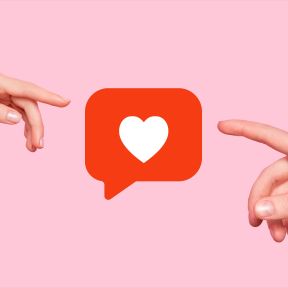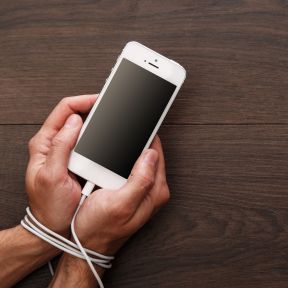
Internet Addiction
More a popular idea than a scientifically valid concept, internet addiction is the belief that people can become so dependent on using their mobile phones or other electronic devices that they lose control of their own behavior and suffer negative consequences. The harm is alleged to stem both from direct involvement with the device—something that has never been proven—and from the abandonment of other activities, such as studying, face-to-face socializing, or sleep.
Contents

There is much debate in the scientific community about whether excessive internet use can be classified as a true addiction. In an addiction to substances such as drugs or alcohol, consumption ceases being pleasurable but continues and is difficult to escape even as the likelihood of harm to the body and life mounts. In the case of internet use, there is no clear point at which being online becomes non-pleasurable for most individuals. In part for this reason, behavioral "addictions," including using the internet, remain controversial: Experts debate where the line should be drawn between passionate absorption in any activity—say, devoting a lot of time to playing the cello or reading books—and being stuck in a rut of compulsivity that stops being useful and detrimentally affects other areas of life.
In preparing the current edition of the Diagnostic and Statistical Manual of Mental Disorders, psychiatrists and other experts debated whether to include internet addiction. They decided that there was not enough scientific evidence to support inclusion at this time, although the DSM-5 does recognize Internet Gaming Disorder as a condition warranting further study.
Most often, the word “addiction” is used in the colloquial sense. Common Sense Media finds that 59 percent of parents “feel” their kids are addicted to their mobile devices—just as 27 percent of the parents feel that they themselves are. Sixty-nine percent of parents say they check their own devices at least hourly, as do 78 percent of teens. Spending a lot of time on the internet is increasingly considered normal behavior, especially for adolescents. Much of their social activity has simply moved online. Like any new technology, the computer has changed the way everyone lives, learns, and communicates. It is possible to be online far too much, even though this does not constitute a true addiction in the eyes of most clinicians.
Internet content creators leverage the ways in which the brain works to rally consumers' attention. One simple example: A perceived threat activates your fight-or-flight response, a part of the brain known as the Reticular Activating System mobilizes the body for action. So online content exploits potential dangers—violence, natural disaster, disease, etc.—to attract and hold your attention.
Problematic or excessive internet use can indeed pose a serious problem. It can displace such important needs as sleep, homework, and exercise, often a source of friction between parents and teens. It can have negative effects on real-life relationships.
The idea of internet addiction is a particular concern among parents, who worry about the harmful effects of screen time and often argue about device use with their children. According to a 2019 survey conducted by Common Sense Media, children aged 8 to 12 now spend 5 hours a day on digital devices, while teens clock more than 7 hours—not including schoolwork. Teen screen time is slowly ticking upward, and most teens take their phones to bed with them.

Whether classified as an addiction or not, heavy use of technology can be detrimental. It can impair focus, resulting in poor performance at school or work. Excessive internet consumption also makes it more difficult for people to communicate normally or to regulate their emotions. They spend less time on non-internet-related activities at the cost of relationships with friends, family, and significant others.
One way to assess whether you’re using the internet too much is to ask yourself if your basics needs (or your child’s, if they are the concern) are being met. Do you sleep enough, eat healthy, get enough exercise, enjoy the outdoors, and spend time socializing in-person? The real harm of screen time may lie in missed opportunities for growth and connection.
Excessive screen time can be particularly harmful to a developing brain: It decreases focus and attention span while increasing the need for more constant stimulation and instant gratification. Those who use the internet excessively may feel anxious if their access to their device gets restricted. They tend to be more impulsive and struggle to recognize facial and nonverbal cues in real life.
Internet use becomes a problem when people start substituting online connections for real, physical relationships. The effects of technology on relationships include increased isolation and loneliness. Defaulting to online communication also denies us the opportunity to hear someone’s voice and read their facial cues in-person; it can also lead to poorer outcomes and miscommunication. Experts recommend that we save the important conversations for when we can be face-to-face for just this reason.
Online content has been designed to elicit specific “checking habits,” which can result in distraction and poor performance at school or work. Constantly checking your smartphone or another device can also lead to relationship-sabotaging behaviors, like phubbing (snubbing loved ones for the instant gratification of checking the internet on your device). As more time is spent online, less is devoted to the natural pleasures of everyday life.

Excessive use of the internet is known to negatively impact a person’s mental health. It has been associated with mental health issues, such as loneliness, depression, anxiety, and attention-deficit/hyperactivity disorder. Research suggests that people are likely to use the internet more as an emotional crutch to cope with negative feelings instead of addressing them in proactive and healthy ways.
This is a subject of debate at present. While internet addiction is not in the DSM-V, it is clearly a behavior that negatively impacts mental health and cognition for many, and many struggle to cut back on their time online. The term "addiction" is often used as a shorthand for, “My child spends a lot of time on social media, texting friends, or playing video games, and I’m worried how it will affect his or her future development and success.” At the same time, many people label it a behavioral addiction, engaging reward circuitry seen in other problematic behaviors such as gambling.
Time online is also sometimes used as an escape from boredom or relief from loneliness or other unpleasantness. Occasionally, excessive screen time masks a state of depression or anxiety. In such cases, digital engagement becomes an attempt to remedy the feelings of distress caused by true mental health disorders that could likely benefit from professional or other attention.
Given how much people rely on technology to complete everyday tasks, from online schooling to paying bills to ordering food to keeping in touch with loved ones who are far away, it isn’t feasible to stop using the internet altogether. In most cases, the goal should be to reduce the time spent online. Many of those who’ve struggled to balance internet use with other activities recommend such simple “digital detox” measures as leaving devices in the kitchen or any other room but the bedroom at night. Cognitive behavioral therapy can also help address addiction-like behaviors, like constant checking habits.

Amidst growing concerns about the increased amount of time people are spending online, the “digital detox” has become a popular way to cope. A digital detox involves temporarily abstaining from using devices, like computers and smartphones. Someone may go on a digital detox in order to re-engage with a passion or activity, focus more on in-person interactions, or break free of a pattern of compulsive or excessive use. Digital detoxes also allow more time for self-care that a person may have been neglecting in order to stay plugged into the internet, which can lead to lower stress levels and better sleep.
There is no one-size-fits-all answer. You may want to digitally detox if you notice that you’re experiencing sleep disruptions due to staying up late or waking up early to be on a device, if the internet is making you feel depressed, or if the constant need to be connected causes you stress. Other signs may include feeling anxious if you can’t locate your phone, having FOMO (fear of missing out) if you’re not checking the internet or social media, struggling to focus without (or due to) constant checking behaviors, etc.
Unlike other detoxes where the goal is to abstain completely, digital detoxes are more flexible and tailored to the individual. It may not be possible due to work or personal obligations to shut your devices off entirely for long periods of time. If it’s time for a digital detox, there are some strategies you can try: Block off non-screen time during the day and/or night, set a “digital curfew” for using devices at night or on weekends, specify digital-free spaces in your home (e.g., the bedroom or dinner table), and use the additional time in fulfilling ways (e.g., socialize, rekindle old interests, volunteer, etc.).
Use the internet and social media with purpose; set time limits on your unstructured use to avoid going down long and unfulfilling rabbit holes. Take advantage of the extra free time you suddenly have. Spend more time socializing in-person and volunteer. Rekindle old interests or take up a new hobby. Go outside. Pay more attention to how you are feeling, both physically and emotionally.














